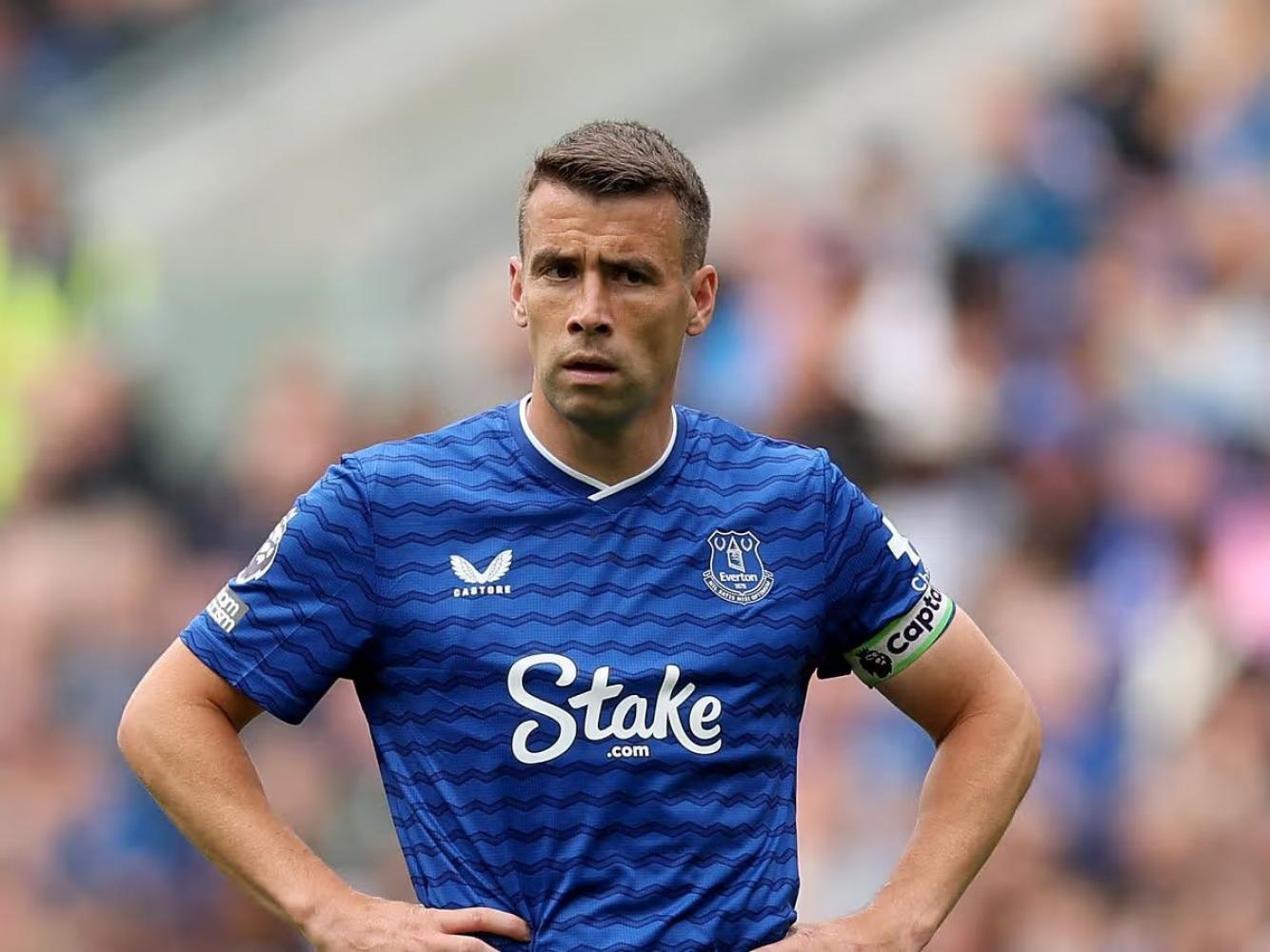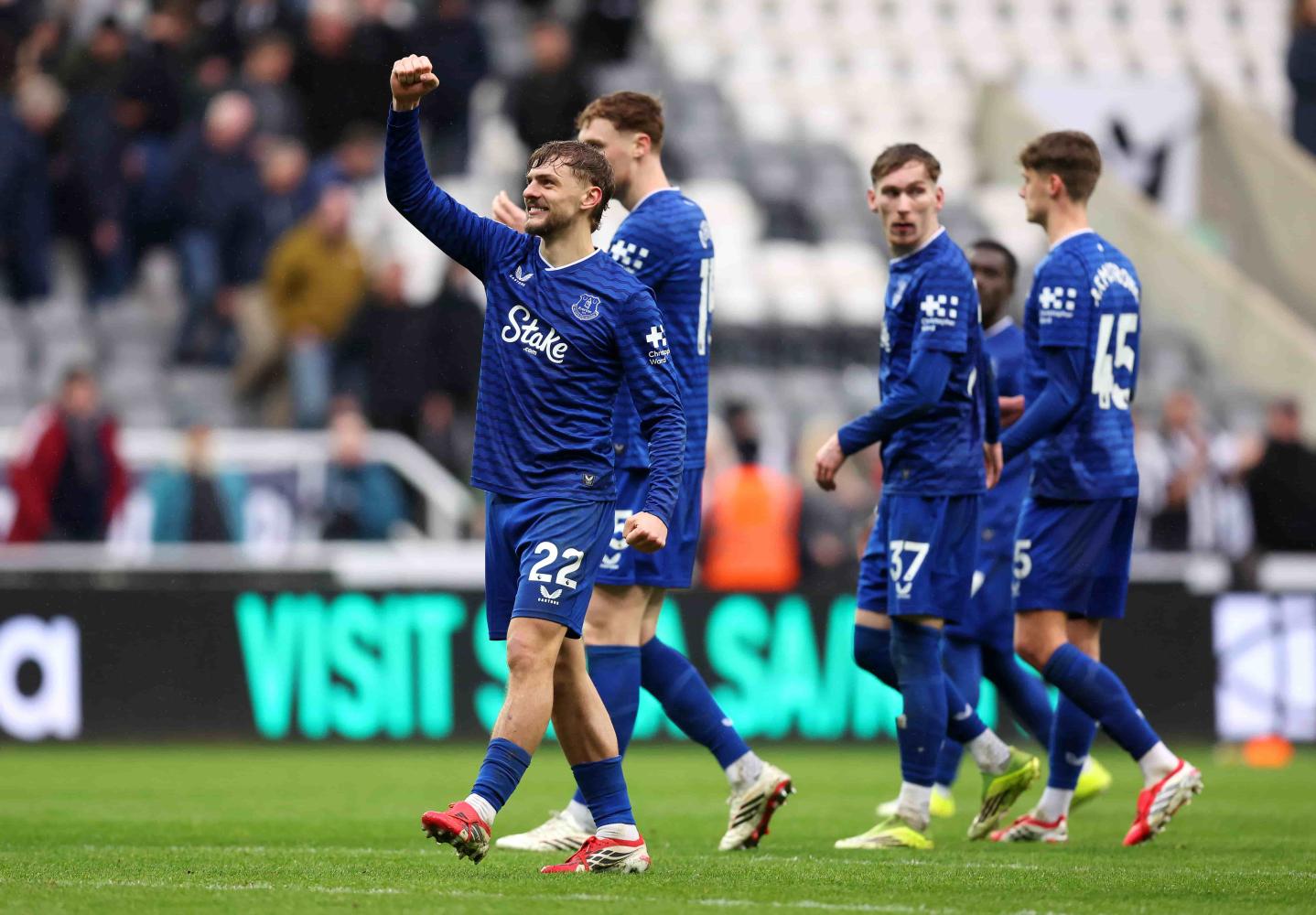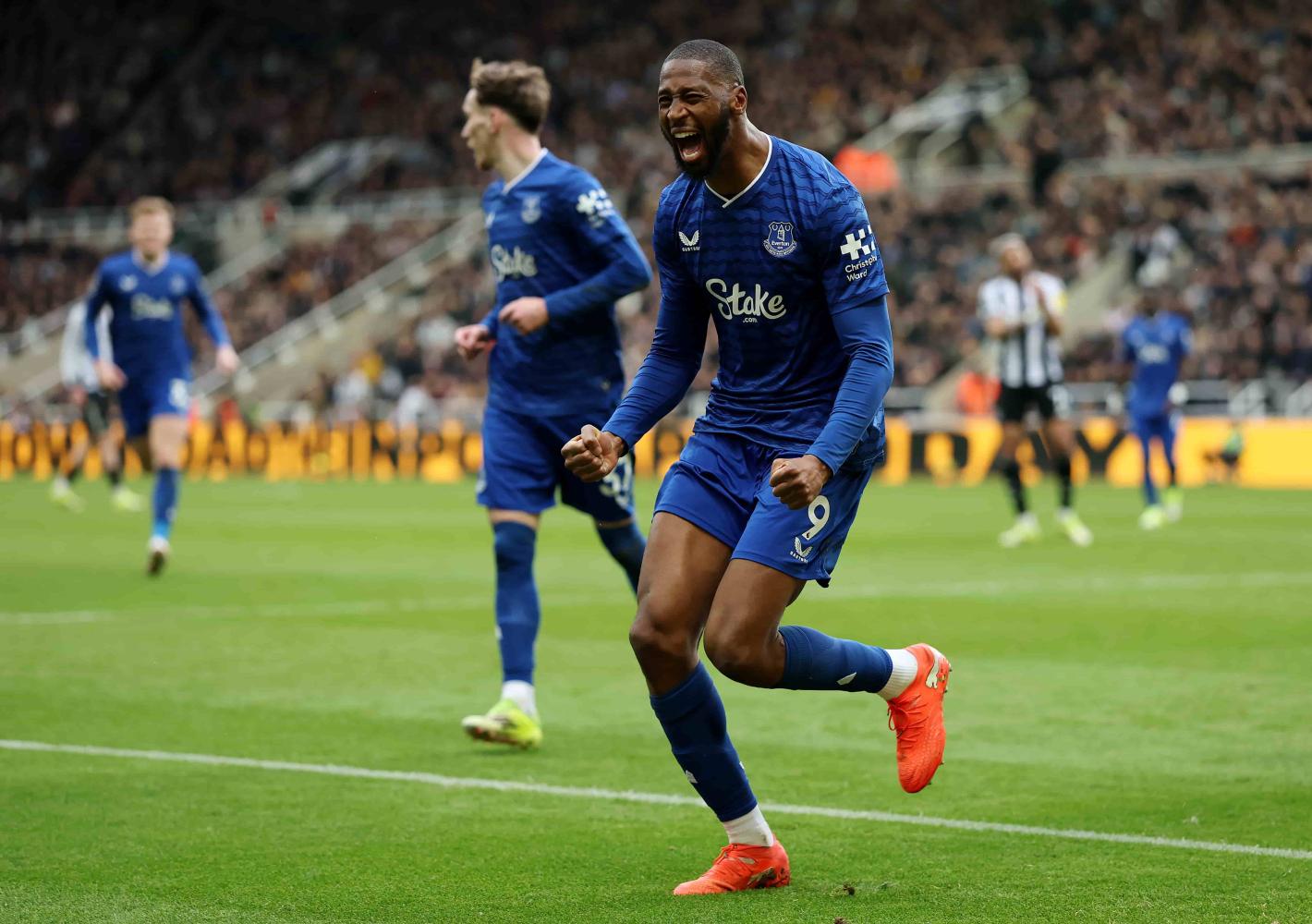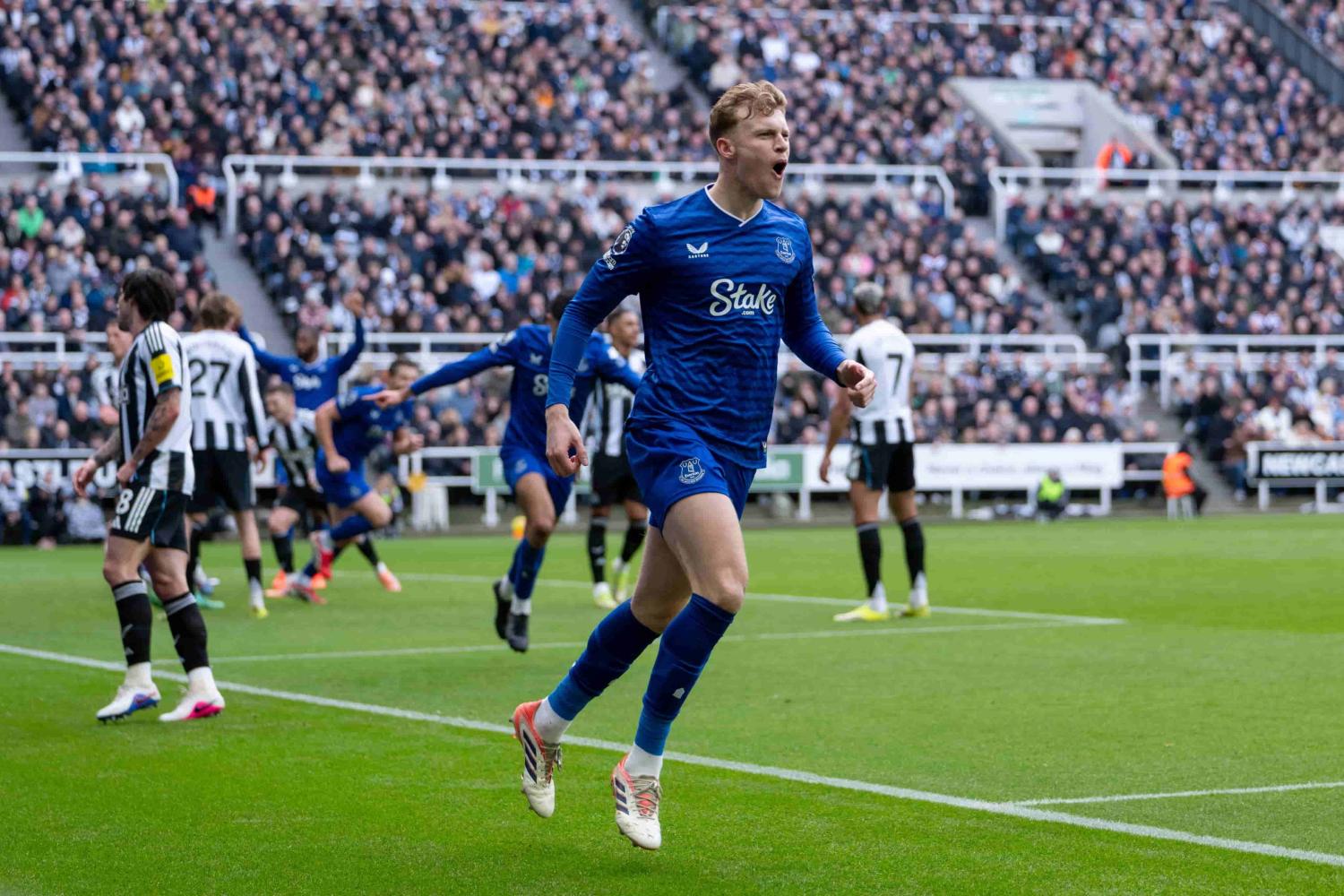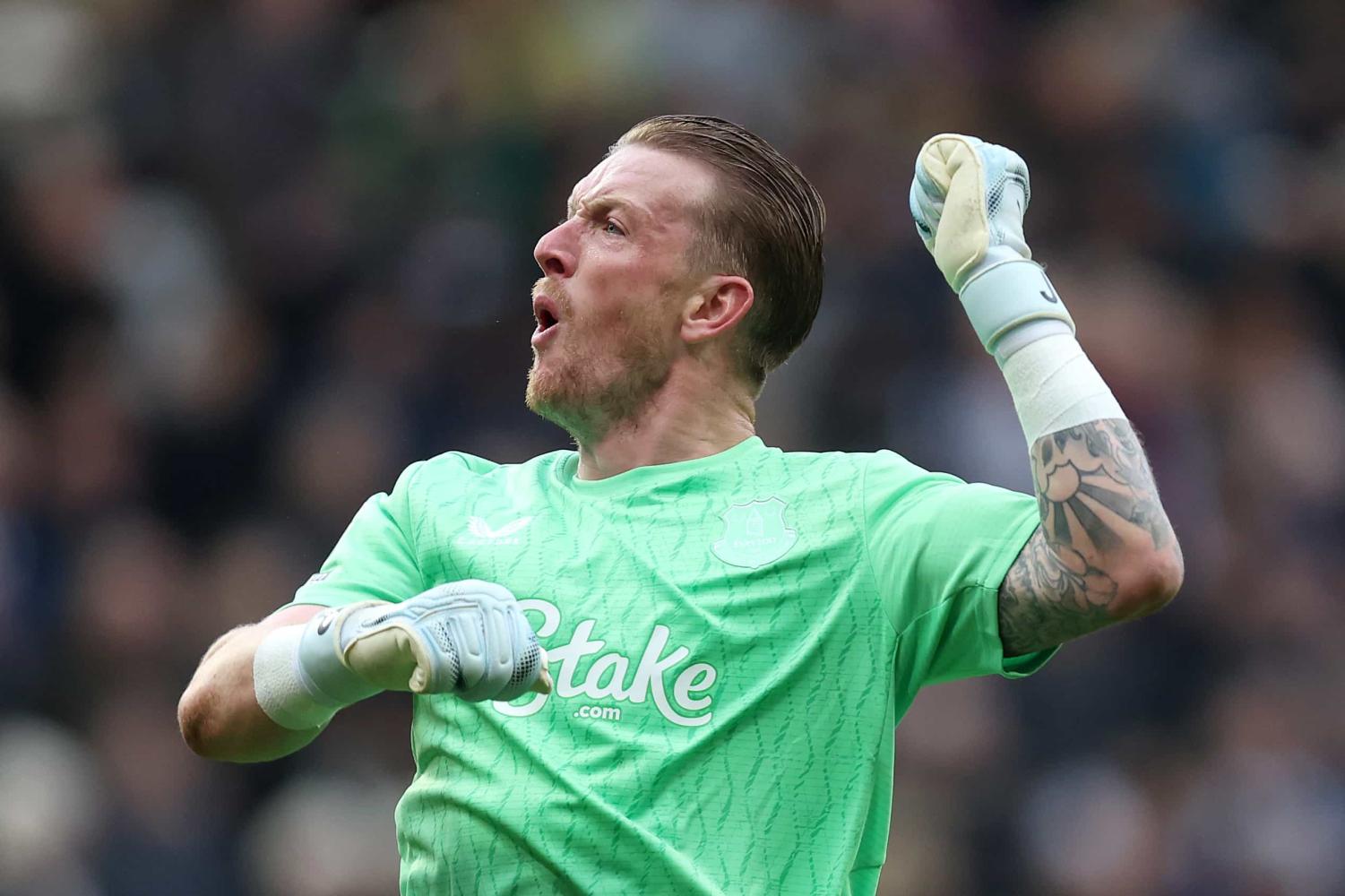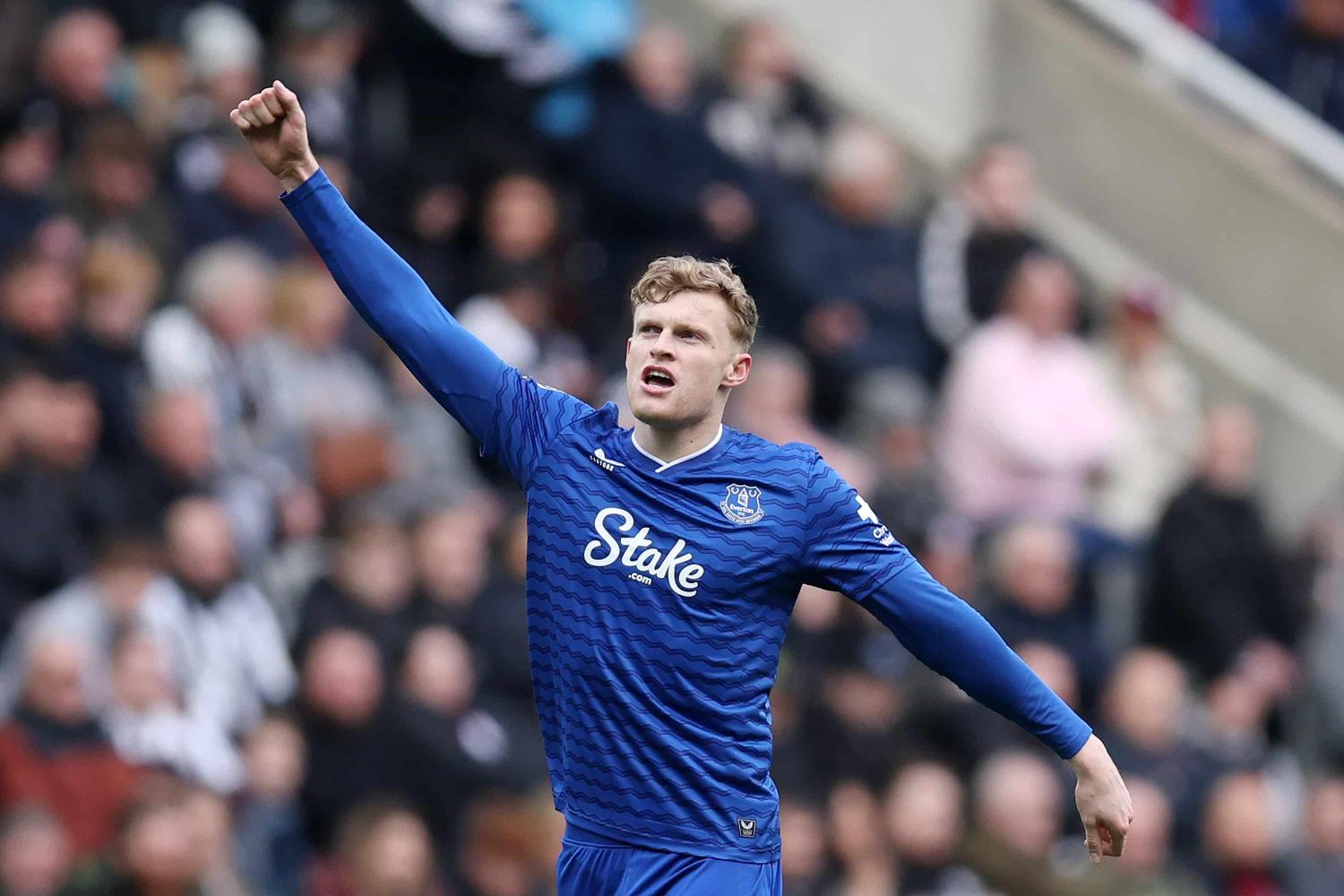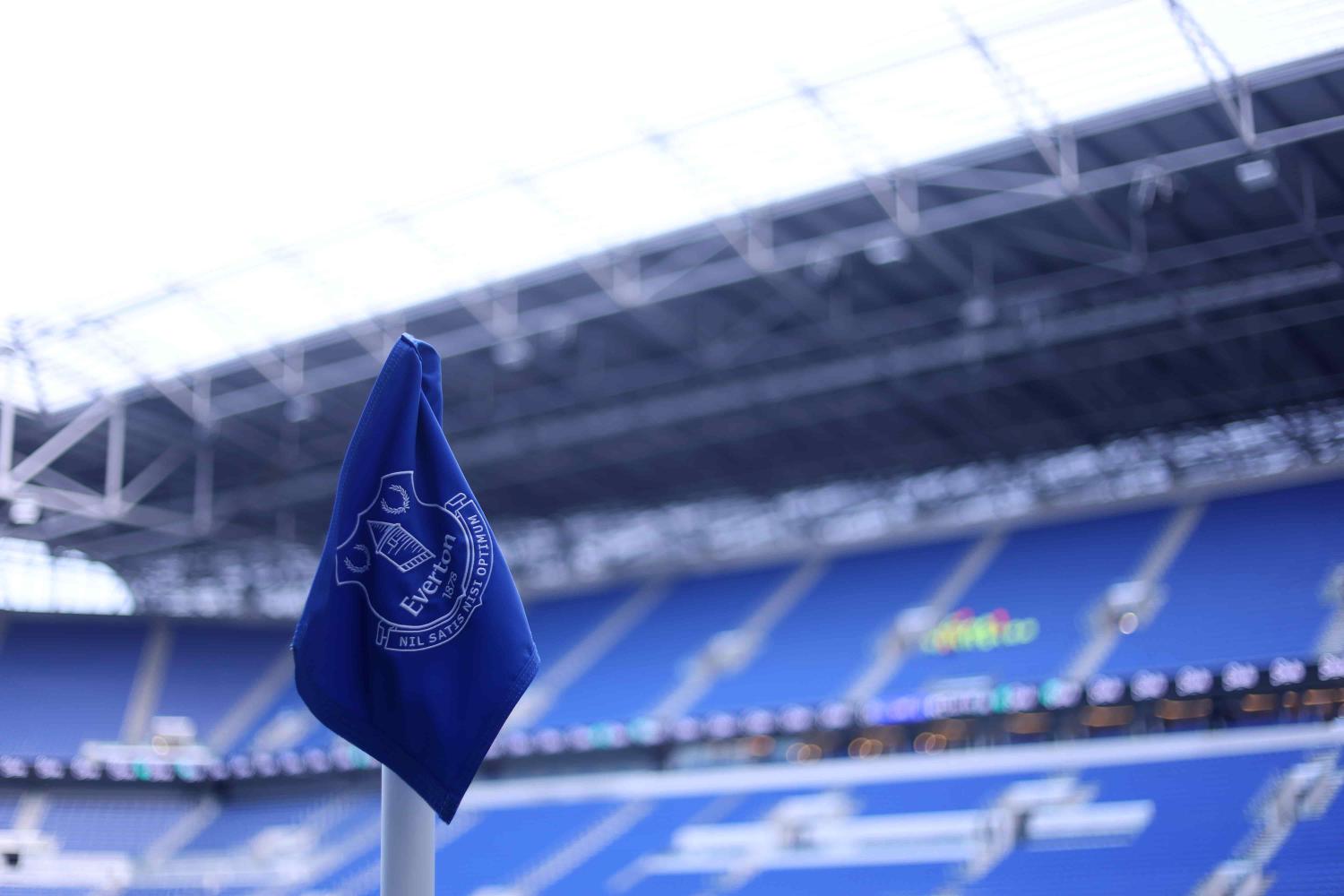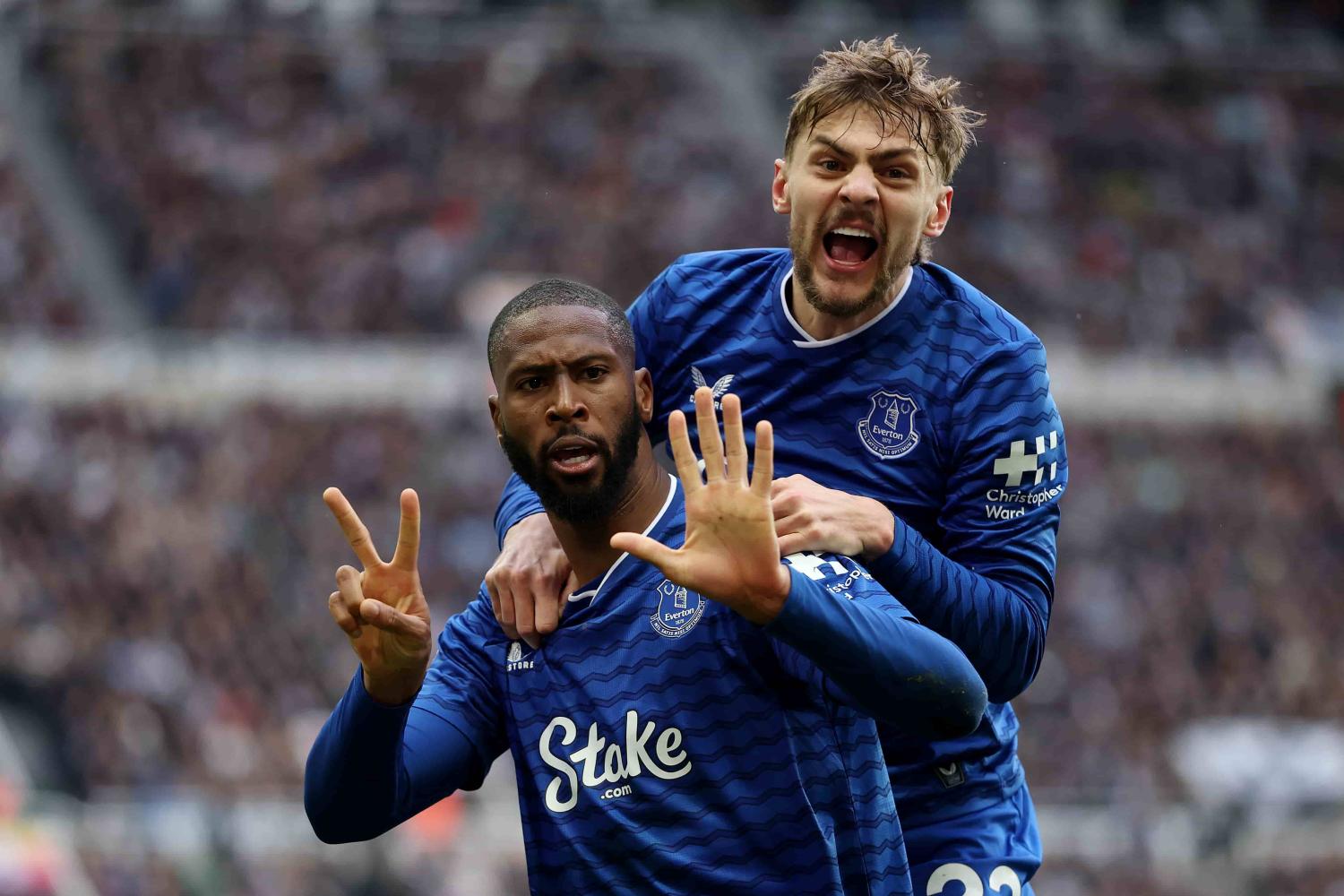Everton Players » Profiles
Duncan Ferguson
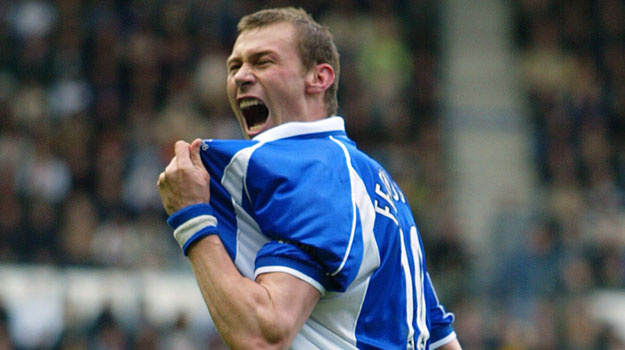
When a desperate Mike Walker recruited two
Rangers players for a month's loan in October 1994 in a bid to arrest an
alarming run of games without a win that had sent Everton tumbling to the
bottom of the Premiership, most Evertonians knew more about midfielder Ian
Durrant than towering striker Duncan Ferguson.
However, a month later, after Walker had been sent packing and Joe Royle
had assumed control of the Goodison hotseat, it was Ferguson to whom the
new manager turned to form the bedrock of his fledgling tenure. The
6' 4" Scot was signed for £4m and Everton folklore was about to be
augmented by the Duncan Ferguson saga.
Having started his career at Carse Thistle, Ferguson broke into the Dundee
United team at the age of 18. A call up to the Scotland U-21s was
followed in 1992 with a summons to the full national side for the game
against the United States. Still relatively unproven at the higher levels,
Dundee United received, and turned down, £3m bids from Bayern Munich,
Leeds United and Chelsea before Walter Smith decided to break the then British
transfer record and bring Ferguson to Ibrox Park for £4m.
A torrid spell of suspensions and injuries restricted Ferguson to just 14
appearances and 2 goals before he was loaned to Walker's struggling
Everton in the autumn of 1994 along with team-mate Durrant. Neither
player had much of an impact on the Toffeemen's fortunes and Walker was
dismissed that November, but Royle had clearly seen something in him and decided that Ferguson was worth keeping
and snapped him up for £4.4m.
Ferguson's impact was immediate; on his full debut he scored the first goal in a now-famous 2-0 home win over Liverpool that kick-started a three-game winning streak and set the Blues on their
way to safety from relegation and an FA Cup the following May. 8
goals that season, scored in just 23 appearances, turned "Big Dunc" into a
Goodison idol as he helped the Blues to the semi-finals of the FA
Cup. The rest of the squad took over from there, setting up a
substitute's appearance for an unfit Ferguson in the triumphant final
against Manchester
United, the team Ferguson had consigned to defeat earlier in the
season with a fine headed goal that typified his style.
The 1995-96 season started full of promise for Everton with the arrival of Andrei Kanchelskis signalling the
beginning of a mouth-watering partnership with Ferguson. However, a
dislocated shoulder forced the flying Ukrainian onto the sidelines and
when he returned Ferguson was either injured with a prolonged hernia
problem or in prison and suspended for the head butting of Raith Rovers'
John McStay in April 1994. Royle claimed that, had he had
Ferguson and Kanchelskis playing together for the full season, Everton
would definitely have achieved European qualification at least. As it was,
a goal by Dennis Bergkamp 6 minutes from time against relegated Bolton
meant that Arsenal took the final UEFA Cup place on the last day of that
season.
The 1996-97 campaign started well for Ferguson who was raring to go.
Three phenomenal performances in the opening games of the season, the 2-2
draw at Old Trafford in particular when Duncan blasted Everton into a 2-0 lead, were
unfortunately followed by a troublesome knee injury that required keyhole
surgery and restricted him to the sidelines. Nevertheless he
returned to help the club avoid the spectre of relegation after Joe Royle
resigned in March 1997.
After the farcical search for Royle's successor in the summer of 1997, it
appeared as though Duncan had been struck by the disappointment the fans
had been enduring in recent months. The form and maturity he showed
for the first half of the season demonstrated a will to repay the
adulation of the Everton faithful under the fresh start offered by Howard
Kendall's return to the Goodison hotseat. By Christmas, Ferguson had
been handed the captaincy and as the team slid back into relegation
danger, his worth to the team was emphasised beyond doubt when he was
suspended for three games in February and March 1998. A team
stripped of his inspiration and talismanic leadership looked hopelessly
bereft of direction.
International honours would be the natural progression for any other
player but in 1997, Duncan Ferguson informed the Scottish FA that he would
no longer be representing his country at international level, a gesture of
defiance at his treatment by the SFA in 1996 when they upheld a 12-match
ban on top of his prison sentence.
Having led Everton to the brink of relegation in 1997-98, Kendall was
forced out by then chairman Peter Johnson and Ferguson's former boss Walter Smith was appointed as
his successor. His arrival and Johnson's promise of cash for
player reinforcements heralded the opportunity for a new start at
Goodison. Scrapping for Premiership survival was no longer
satisfactory but Ferguson's towering presence and effectiveness in the air
meant the team still relied on him as the number one outlet from defence.
With the likes of midfield playmakers like Nick
Barmby, John Collins and Don
Hutchison being by-passed by the route-one tactics and opposition
defences having learned how to deal with Ferguson, the Blues' results
suffered; discontent set in. That disquiet intensified in a 3rd
Round League Cup penalty shoot-out with First Division Sunderland when Captain Ferguson refused to take a spot-kick. Everton crashed out of
the competition and a week later, Ferguson was gone.
In an effort to appease the bankers, Ferguson was sold by Johnson — right from under the feet of manager Walter Smith.
Behind the scenes at an evening game with Newcastle
United, negotiations were held with the same club to transfer Duncan
to St James' Park for £8m. The shockwaves from the reaction from
the supporters — they were furious, not so much with the fact that
Ferguson that he had been sold but more with the manner of his sale —
forced Johnson to finally see sense and step down as chairman, while the
cash raised from the deal went straight into easing the club's
overdraft. An era had ended.
Despite his imperfections, his horrendous injury record and the volatile
streak that reared its ugly head all too often, his proud record against
Liverpool and his commitment beyond the call of duty at times ensured that
the man with the famous Everton tattoo would go down in Everton
folklore. The supporters were probably content to close that chapter
in Everton's history, but Ferguson was back at Goodison in August 2000.
After two injury-ravaged years at Newcastle and with Everton facing the
prospect of being without goalscoring hero Kevin Campbell for the first
few months of the 2000-01 season, Ferguson was re-signed by Everton, this
time by new owner Bill Kenwright. While many understood the romantic
sentiment of bringing the "talisman" home, it seemed as though
only a minority of fans actually agreed that bringing Ferguson's injury
problems back was a
good idea, not least because of the effect it might have on Everton's style of play. Worse, it later transpired that the £3.75m Everton paid
Newcastle for his services was gambled on the successful conclusion of a
media deal with NTL that was never signed.
The irony of re-signing a player known for his injury problems to replace
another injured player was seemingly lost on Messrs Kenwright and
Smith. Ferguson was duly injured in only the second appearance of
his return spell with the Blues. He was in and out of the team that
season with recurrent injury problems that required surgery, but he still
managed to weigh in with 6 goals in 13 appearances to help Everton stave
off the the threat of relegation once more.
Ferguson, much like his pigeon-fancying off-the-field persona,
remained a frustrating enigma. While he gradually curtailed the wilder side of
his nature that attracted regular attention from referees, he seemed to have lost much of his motivation, mobility and hunger for the Everton
cause. After more fitful attempts to regain full fitness, however, the cause of the "Big Yin's" chronic injury problems
was finally identified: a compressed sciatic nerve, a condition that the Everton physio surmised he had
probably struggled through for four years with pain manifesting itself in the leg, back,
pelvis or groin and was, therefore, very hard to diagnose.
Ferguson eventually regained reasonable match fitness and began to score
goals again in 2003-04, many from the penalty spot but his infamous red mist descended again in a niggly game at Leicester when as he was sent off for two
yellows, and, in an enduring image, he proceeded to strangle Steffen Freund in frustration.
In the summer of 2004, Everton tried to buy off the last year of his
contract — about £2m in salary — for a paltry £½m. Big Dunc,
as you'd expect, turned it down and adopted a new role as a substitute
to sustain David Moyes's assault on the top of the Premiership. It was enough to earn him a contract extension the following summer but his final season was largely disappointing, soured by the controversial decision by Pierlugi Collini to disallow a goal at Villarreal that might have sent the Toffees into the Champions League. The now 34 year-old Ferguson avoided the unwanted destinction of becoming the first Everton No.9 not to score in a season when he netted a late penalty against West Bromwich Albion on his final appearance in May 2006.
Ferguson's legacy at Goodison Park is something that has occupied Evertonians for years and the debate over his status as an Everton Legend has never truly been settled. His occasionally costly ill-discipline, his recurrent injuries, patchy appearance record and that infamous rejection of responsibility in the League Cup against Sunderland in 1998 have all been used in the case against him as a true club legend worthy of Gwladys Street's Hall of Fame.
He unquestionably had an idol-like status at the club, though, during some of its darkest days. He was instrumental in the season under Royle in which Everton were transformed from relegation certainties to mid-table safety and also in the FA Cup run that took the Blues to the semi-finals against Leeds before injury prevented him from taking part in two of the club's more famous days since the formation of the Premier League.
As a symbol of the club's defiance in the face of its decline in the 1990s, Ferguson would always have remained close to the hearts of Evertonians and his return from self-imposed exile from the game to take up a coaching role at Finch Farm cemented his credentials as a man for whom nothing was ever the same once Everton touched him.
His longevity at the club eventually led him to a date with brief but elatory destiny – and, perhaps, a chance to earn that elusive tag of "legend" – in December 2019. Marco Silva's tenure as Everton manager had imploded, the Portuguese being summarily fired with the team at a low ebb following a 5-2 defeat at Anfield that had left the club in the bottom three and supporters fearing a protracted battle against relegation.
In need of a fillip, Chairman Bill Kenwright turned to "Big Dunc", handing him the reins for a home match with League title-chasing Chelsea. With a mixture of old-fashioned motivation and a return to 4-4-2, the Scot inspired a feisty, high-octane and determined performance from his charges who ran out 3-1 winners on an afternoon that would go down in the annals as a truly great occasion at Goodison Park, complete with the emotional interim coach hugging ball-boys after the goals and fist-pumping all four sides of the Grand Old Lady at the final whistle.
He would oversee two more draws, one a creditable point at Old Trafford and a rather drab goalless draw against another managerless side in the form of Arsenal either side of a League Cup quarter-final defeat to Leicester on penalties, before making way for Carlo Ancelotti and would manage the Blues for one more game in January 2022 after Rafael Benitez had been sacked. There would be no heroics that time as Aston Villa ruined his encore and he was overlooked for the manager's role full-time as Frank Lampard was appointed that month, but he would always have that special day against Chelsea to savour.
→ The End of an Era – Ferguson leaves Everton in 2006
FactFile
| Squad number | 9 |
| Position | Striker |
| Nationality | Scottish |
| Date of birth | 27 December 1971 |
| Height | 6' 4" |
| Joined | November 1994 |
| Joined from | Rangers |
| Signed by | Joe Royle |
| Transfer fee | £4.4m |
| Left Everton | November 1998 |
| Destination | Newcastle United, £8m |
| Re-joined | August 2000 |
| Joined from | Newcastle United |
| Signed by | Walter Smith |
| Transfer fee | £3.75m |
| Full debut | v Portsmouth
(a) 5 October 1994 |
| 2nd debut (as sub) | v Leeds
United (a) 19 August 2000 |
| 2nd full debut | v Coventry
City (h), 26 December 2000 |
| Finale | v West Brom (H) 7 May 2006 |
| Left Everton | Released 2006 |
| Previous Clubs | Dundee United Rangers Newcastle United |
| » Soccerbase Datafile » Wikipedia Entry |
Everton Career
| Season | Squad No. | League Apps (sub) | League Goals | Cup Apps (sub) | Cup Goals | Total Apps (sub) | Total Goals |
|---|---|---|---|---|---|---|---|
| 1994-95 | 9 | 22 (1) | 7 | 4 (1) | 1 | 26 (2) | 8 |
| 1995-96 | 9 | 16 (2) | 5 | 2 (0) | 2 | 18 (2) | 7 |
| 1996-97 | 9 | 31 (2) | 10 | 3 (0) | 1 | 34 (2) | 11 |
| 1997-98 | 9 | 28 (1) | 11 | 3 (0) | 0 | 31 (1) | 11 |
| 1998-99 | 9 | 13 (0) | 4 | 4 (0) | 1 | 17 (0) | 5 |
| 2000-01 | 24 | 9 (3) | 6 | 1 (0) | 0 | 10 (3) | 6 |
| 2001-02 | 10 | 17 (5) | 6 | 3 (0) | 2 | 20 (5) | 8 |
| 2002-03 | 10 | 0 (7) | 0 | 0 (1) | 0 | 0 (8) | 0 |
| 2003-04 | 10 | 13 (7) | 5 | 4 (0) | 4 | 17 (7) | 9 |
| 2004-05 | 10 | 6 (29) | 5 | 2 (0) | 1 | 8 (29) | 6 |
| 2005-06 | 9 | 7 (19) | 1 | 3 (3) | 0 | 10 (22) | 1 |
| Totals | 162 (76) | 60 | 29 (5) | 12 | 191 (81) | 72 |
Previous Career
| Season | Team | Appearances (sub) | Goals |
|---|---|---|---|
| 1988-1992 | Dundee United | 75(2) & 8(1) | 28 & 6 |
| 1992-1994 | Glasgow Rangers | 8(6) & 3(5) | 2 & 0 |
| 1998-2000 | Newcastle United | 24(6) & 8(3) | 8 & 4 |

